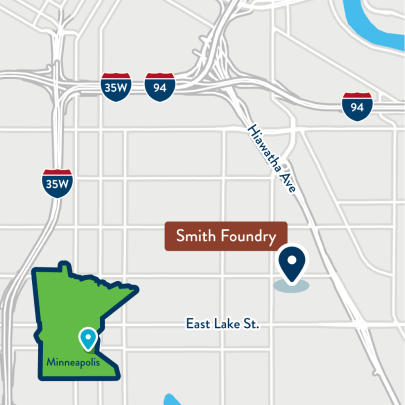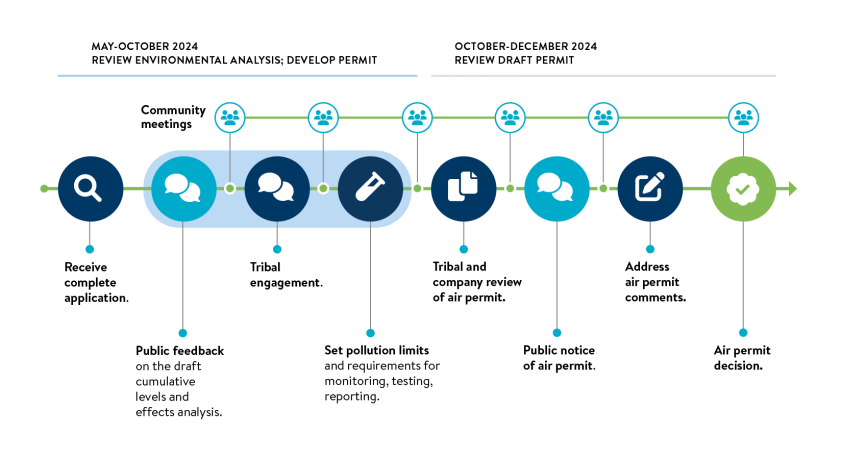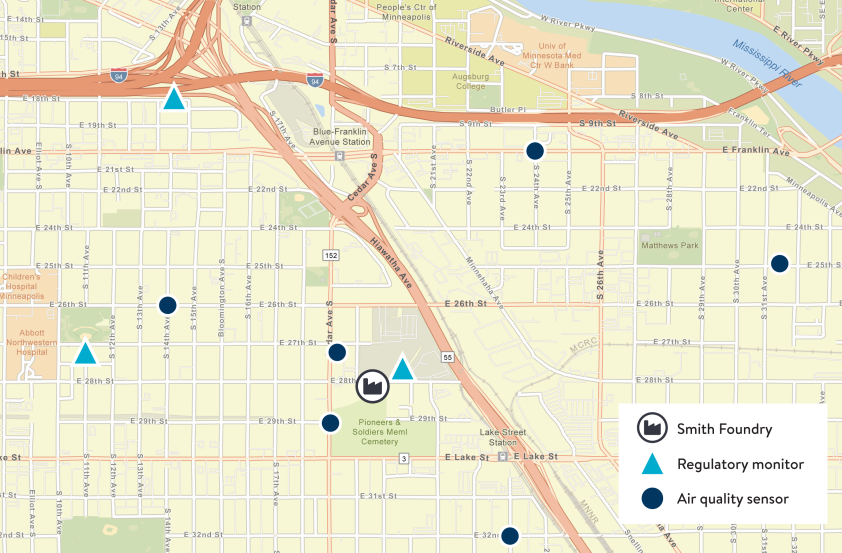
Smith Foundry, located at 1855 E. 28th St. in the East Phillips neighborhood of Minneapolis, produces iron castings for use with industrial machinery and the manufacturing of transportation equipment. The facility operates under an MPCA air permit that is up for renewal.
The neighborhood is an environmental justice area that consists of mixed residential, commercial, and industrial properties.
In August 2023, the U.S. Environmental Protection Agency issued Smith Foundry a notice of violation for allegedly releasing air pollution at levels that exceed regulations.
The MPCA is working with local, state, and federal partners to monitor pollution from Smith Foundry and protect the health and well-being of East Phillips residents.
Our role
The MPCA is revising Smith Foundry’s air permit and awaits its completed air permit application and a required cumulative levels and effects analysis.
In response to an MPCA request, the company submitted a plan to test, monitor, and report its air emissions. That plan includes an analysis of all options for measuring and monitoring emissions, including continuous monitoring. The company also committed to reporting actual lead emissions rather than the maximum allowable lead emissions and has submitted an assessment of raw materials, including lead, used by the facility since the current owners, Zynik Capital, purchased the foundry in December 2022.
To better understand air quality conditions in the surrounding neighborhood, the MPCA has installed additional air monitoring sensors and is reviewing that data. The MPCA has also reviewed EPA-ordered stack testing of its fine particulate and lead emissions.
Permit
Air permitting in South Minneapolis is subject to a law passed by the Minnesota Legislature in 2008 that requires extra studies called cumulative levels and effects analyses for any new or reissued air permits in this area of South Minneapolis.
The MPCA continues to review the permit application and will provide an update at a later time.
Next steps and timeline
May-October 2024: Review environmental analysis and develop permit
- Receive complete application.
- Public feedback on the draft cumulative levels and effects analysis.
- Tribal engagement.
- Set pollution limits and requirements for monitoring, testing, and reporting.
- Three community meetings.
October-December 2024: Review draft permit and decision
- Tribal and company review of air permit.
- Public notice of air permit.
- Two community meetings.
- Address air permit comments.
- Air permit decision and community meeting.

Community dialogue
The MPCA is committed to maintaining an ongoing dialogue with the East Phillips community about our agency’s work in the neighborhood. We cannot fulfill our commitment to environmental justice nor our mission to protect and improve the environment and human health without including the community’s voices and perspectives. Our agency is working with community leaders to identify opportunities for regular conversations about the Smith Foundry facility and air quality in East Phillips as we move forward.
The MPCA held community conversations on November 27, December 1, and February 7 to hear residents’ concerns and answer questions about the foundry’s existing air permit. The December 1 meeting was held online and recorded.
Submit your questions and comments
The MPCA welcomes questions and concerns from the community about this project and our work in the East Phillips neighborhood. Please email smith.foundry@state.mn.us and the MPCA will provide a prompt response. Please check back on this page for updates.
More information
Emissions monitoring plan
Smith Foundry submitted its emissions monitoring plan to the MPCA on our deadline of April 19. The plan, developed at MPCA’s request, outlines how the company will test, monitor, and report emissions coming from its facility. It includes analysis of various methods to measure and monitor emissions from the foundry, related costs, and feasibility of each.
The emissions monitoring plan recommends installing bag leak detection systems at Smith Foundry:
- The systems combine a sensor with data collection to continuously monitor and measure particulate matter from the facility’s stacks.
- They detect increases of emissions and defective dust collection bags, and report issues through light notifications on stacks, text messages, and email messages so employees can address and correct problems.
- Smith Foundry will install the systems at four baghouses and the stack that will serve a proposed new capture and control system for emissions from the furnace and pouring/cooling lines.
- This technology is successfully implemented at other foundries around the world.
The MPCA is reviewing the emissions monitoring plan and will instruct Smith Foundry how to incorporate the plan into its operations. The new monitoring systems also will be incorporated into the company’s new air permit.
Fine particulate matter is reported in daily averages and available at East Phillips community fine particles monitoring data.
Air monitoring
Community air sensors currently gather data on air quality near Smith Foundry, including two within two blocks of the facility. The data from those sensors can vary based on weather and other factors but show no significant and long-term emissions concerns.
The MPCA has installed two additional regulatory air monitors near Smith Foundry to measure lead and fine particle concentrations. The MPCA's air monitors continually measure pollutants to help improve and protect outdoor air. With this data, the agency can track pollution trends over time and show if outdoor air meets air quality standards and health benchmarks. Air monitors have strict requirements and are tested often to ensure high quality data. Air sensors are often used as a low cost, accessible alternative to air monitors. However, air sensor data may not be reliable enough to use for compliance or to compare to the air quality standards.
This table shows the lead concentration values from samples collected by the East Phillips Community monitor along with the wind direction on those days.
| Sampling date | East Phillips Community lead value (µg/m3) * background Twin Cities lead level is 0.01 µg/m3 | Predominant wind direction** |
|---|---|---|
| 1/13/2024 | 0.002646 | WSW |
| 1/19/2024 | 0.002394 | WSW |
| 1/25/2024 | 0.002639 | Unavailable |
| 1/31/2024 | 0.007670 | SW |
| 2/12/2024 | 0.002973 | WSW |
| 2/24/2024 | 0.006145 | S |
| 3/13/2024 | 0.002655 | NE |
| 3/19/2024 | 0.006277 | SW |
| 3/25/2024 | 0.003276 | ENE |
| 3/31/2024 | 0.002711 | NE |
** Smith Foundry is located WSW of the monitor.

Stack testing
The U.S. EPA required Smith Foundry to complete air emissions monitoring in the facility’s stack as part of the agency’s ongoing investigation. A third party conducted the stack test in December 2023. The stack test results are a key component in verifying any lead emissions and the amount of particulate matter coming directly from several of the operations at the Smith Foundry facility.
The MPCA and EPA analyzed the stack test results in January 2024 and verified that Smith Foundry is not emitting more particulate matter than allowed by its permit at those operations. The test detected low amounts of lead coming from the facility. These results are now part of the EPA's continuing investigation at Smith Foundry.
The data from that stack test represent a snapshot of Smith Foundry’s emissions, gathered over three days in December 2023. MPCA and EPA staff will factor in the facility’s production amounts as part of an analysis of the test results to calculate the total emissions from the facility throughout the year. MPCA and EPA staff can then compare that amount to established emission limits for Smith Foundry.
Inspections and complaints
2023
- May: U.S. EPA inspected Smith Foundry and discovered potential Clean Air Act violations from the foundry’s operations.
- August: The EPA issued a notice of violations to Smith Foundry. MPCA continues to work closely with the federal agency on its investigation.
- November: The MPCA completed an unannounced inspection and found all pollution control equipment operating. The agency shared additional information gathered with the EPA to include in the federal investigation.
Earlier activities
- July 2006: Smith Foundry paid a $13,871 penalty for air quality and air permit violations resulting from a complaint of "black sand" surrounding the foundry. An MPCA investigation determined that the emissions resulted from the failure of particulate-trapping equipment called a baghouse. A subsequent MPCA inspection discovered overdue performance testing of equipment and use of other equipment not covered by the company's air permit. The foundry corrected the violations and submitted a detailed plan to avoid similar violations.
- December 2018: The MPCA completed a full inspection of Smith Foundry and found no violations.
- From 2018 to 2023. The MPCA received 13 complaints about the foundry. Ten were odor-related and referred to the City of Minneapolis, which oversees odor complaints. Two complaints were stormwater-related and addressed by Smith Foundry. The MPCA addressed a complaint regarding black smoke during the November 6, 2023, inspection.